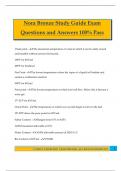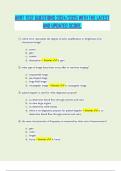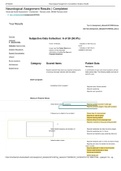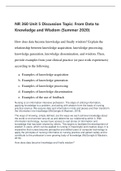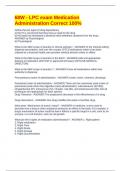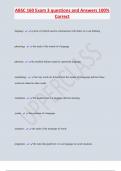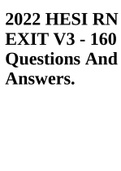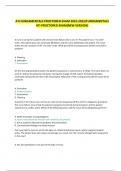CPA UNIT 11 – LAY-BYS AND FRANCHISE AGREEMENTS
Study material:
• Nagel et al (2019) paras 41.137 – 41.138 and 41.142 – 41.143
• Delineation:
o S62: Lays-bys
o S65: supplier to hold and account for consumers property
o Regulation 34 of the Consumer Protection Regulations
Lay-bys governed under Part 1 of the CPA = supplier’s accountability to consumers
Understand what a lay-by agreement is – Section 62 (1)
✓ If a supplier agrees to sell particular goods to a consumer
✓ To accept payment for those goods in periodic instalments
✓ And to hold those goods until consumer has paid full price for the goods
The system allows a consumer to choose an item/goods = usually clothing, furniture
or a piece of jewellery = and pay it off every month, with no interest added.
Prior to the CPA:
✓ The law allowed the consumer to cancel the agreement at any time
✓ And the store had to repay all money paid, minus 10% as a cancellation
penalty
✓ But in practice, many smaller independent stores refused to refund customers
at all
Recognise that goods under lay-by agreement remains at the risk of the
supplier and instalments remain property of consumer until goods under the
lay-by agreement is delivered
✓ Instalments paid by the consumer to the supplier = remains property of the
consumer until delivery [Section 62(1)]
✓ The goods that the consumer is paying instalments for = remains at the
risk and property of the supplier until delivery [Section 62(1)]
, Discuss the rights of the consumer where the supplier is unable to deliver the
goods when the full purchase price is paid in terms of section 62 (2)
✓ If the supplier is unable to deliver lay-by goods when he consumer has paid
the price on full:
1. The supplier must either:
1. At the option of the consumer, supply the consumer with an
equivalent quantity of goods that are comparable/superior in
description, design/quality OR
2. Refund the consumer the money paid by the consumer – with
interest (if the inability to supply the goods is due to
circumstances beyond the suppliers control) OR
3. Double the amount paid by the consumer = as compensation for
breach of CNT
Explain the content of section 62(3) and 62 (5) regarding cancellation of the
lay-by agreement by the consumer and the payment of a cancellation penalty
to the supplier
Section 62(3)
✓ A failure to supply the goods is NOT due to circumstances beyond the
suppliers control:
1. If the shortage results = partially, directly / indirectly = from a
failure on the part of the supplier to adequately and diligently
carry out any ordinary / routine matter pertaining to the suppliers
business
2. For example – did not order enough stock
3. Cannot be used as a defence in this case
Study material:
• Nagel et al (2019) paras 41.137 – 41.138 and 41.142 – 41.143
• Delineation:
o S62: Lays-bys
o S65: supplier to hold and account for consumers property
o Regulation 34 of the Consumer Protection Regulations
Lay-bys governed under Part 1 of the CPA = supplier’s accountability to consumers
Understand what a lay-by agreement is – Section 62 (1)
✓ If a supplier agrees to sell particular goods to a consumer
✓ To accept payment for those goods in periodic instalments
✓ And to hold those goods until consumer has paid full price for the goods
The system allows a consumer to choose an item/goods = usually clothing, furniture
or a piece of jewellery = and pay it off every month, with no interest added.
Prior to the CPA:
✓ The law allowed the consumer to cancel the agreement at any time
✓ And the store had to repay all money paid, minus 10% as a cancellation
penalty
✓ But in practice, many smaller independent stores refused to refund customers
at all
Recognise that goods under lay-by agreement remains at the risk of the
supplier and instalments remain property of consumer until goods under the
lay-by agreement is delivered
✓ Instalments paid by the consumer to the supplier = remains property of the
consumer until delivery [Section 62(1)]
✓ The goods that the consumer is paying instalments for = remains at the
risk and property of the supplier until delivery [Section 62(1)]
, Discuss the rights of the consumer where the supplier is unable to deliver the
goods when the full purchase price is paid in terms of section 62 (2)
✓ If the supplier is unable to deliver lay-by goods when he consumer has paid
the price on full:
1. The supplier must either:
1. At the option of the consumer, supply the consumer with an
equivalent quantity of goods that are comparable/superior in
description, design/quality OR
2. Refund the consumer the money paid by the consumer – with
interest (if the inability to supply the goods is due to
circumstances beyond the suppliers control) OR
3. Double the amount paid by the consumer = as compensation for
breach of CNT
Explain the content of section 62(3) and 62 (5) regarding cancellation of the
lay-by agreement by the consumer and the payment of a cancellation penalty
to the supplier
Section 62(3)
✓ A failure to supply the goods is NOT due to circumstances beyond the
suppliers control:
1. If the shortage results = partially, directly / indirectly = from a
failure on the part of the supplier to adequately and diligently
carry out any ordinary / routine matter pertaining to the suppliers
business
2. For example – did not order enough stock
3. Cannot be used as a defence in this case

